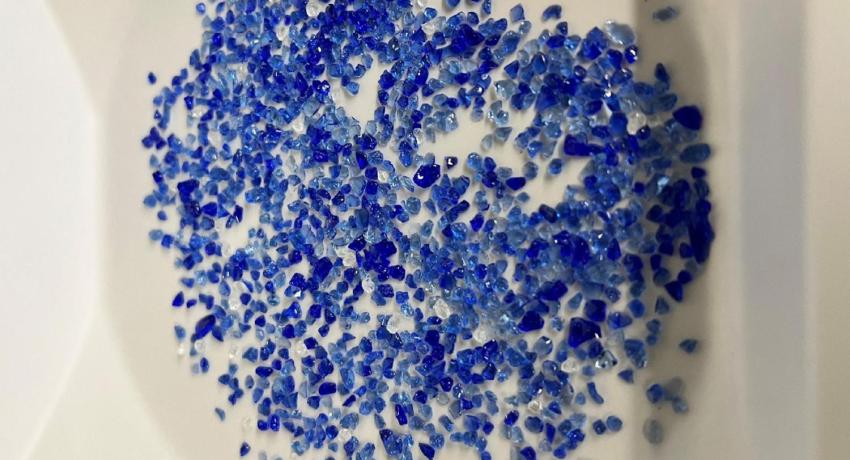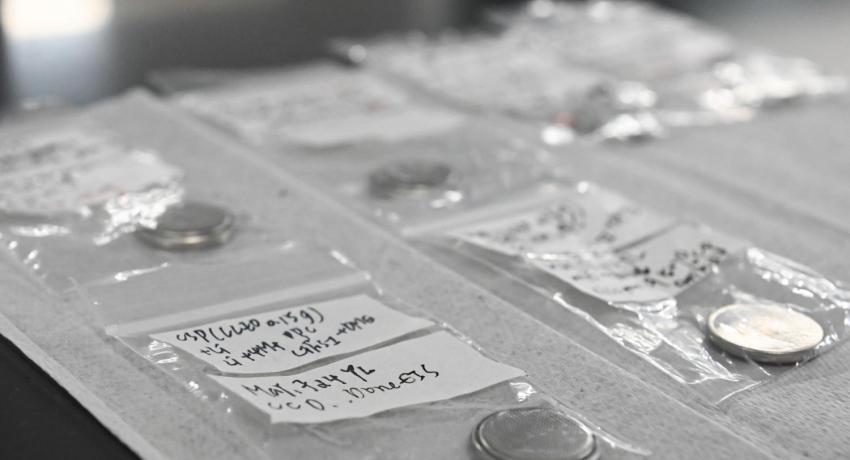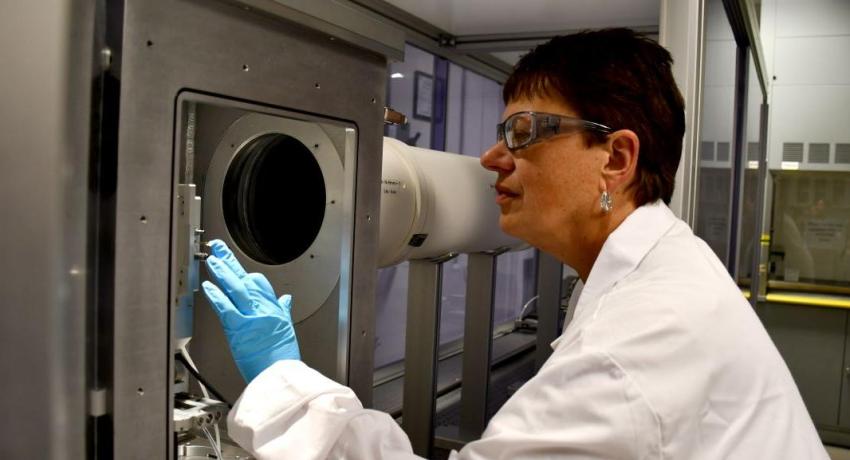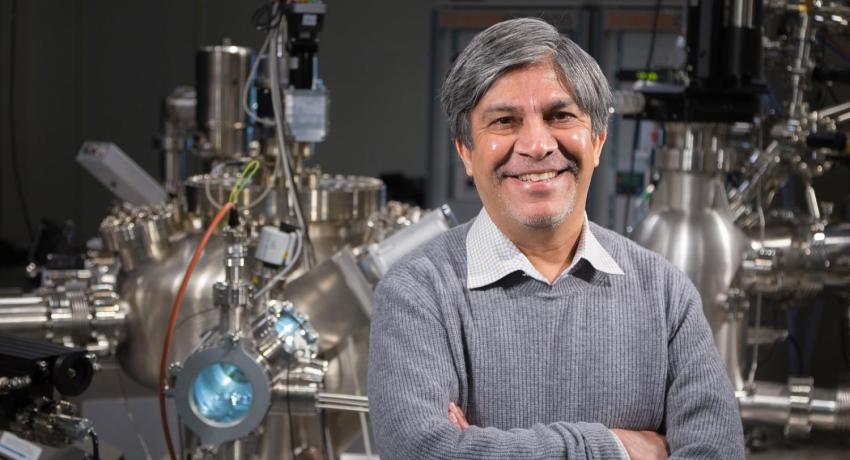Making rechargeable batteries more sustainable with fully recyclable components
By Mariah Lucas
Rechargeable solid-state lithium batteries are an emerging technology that could someday power cell phones and laptops for days with a single charge. Offering significantly enhanced energy density, they are a safer alternative to the flammable lithium-ion batteries currently used in consumer electronics — but they are not environmentally friendly. Current recycling methods focus on the limited recovery of metals contained within the cathodes, while everything else goes to waste.
RMN3
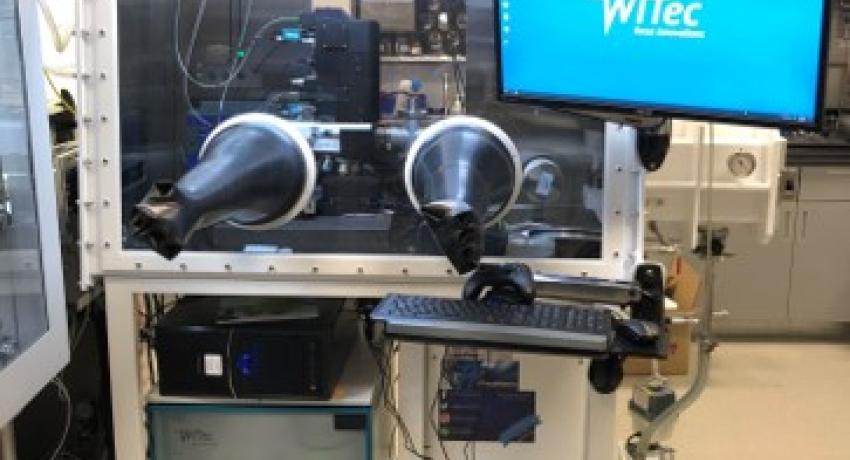
A Witec Apyron Alpha 300R confocal microscope is housed in a glovebox to enable ambient-controlled Raman and photoluminescence measurement. The Witec microscope is fully automated with joystick controller to enabling automated change of lasers (532 nm and 633nm), gratings (300, 600, and 1800 grooves/mm), objective lenses (x5, x10, x50, x100), focus (z height) and stage motion (x-y location), etc. The detector can resolve peaks down to 10 cm-1 (with 532 nm excitation) and has a 0.1 cm-1 spectra resolution (with 632 nm excitation). A Linkam LTSE420P cryostage is available for variable temperature measurements from -196°C to 200°C and has 4 gold-plated tungsten tips for in-situ electrical measurements.
Quick Spec
WITec
alpha300
Location
2DCC
N-125
Millenium Science Complex
491 Pollock Road
University Park, PA 16802
United States
Chalcogenide CVD System with In situ Optical Characterization (MOCVD 2)
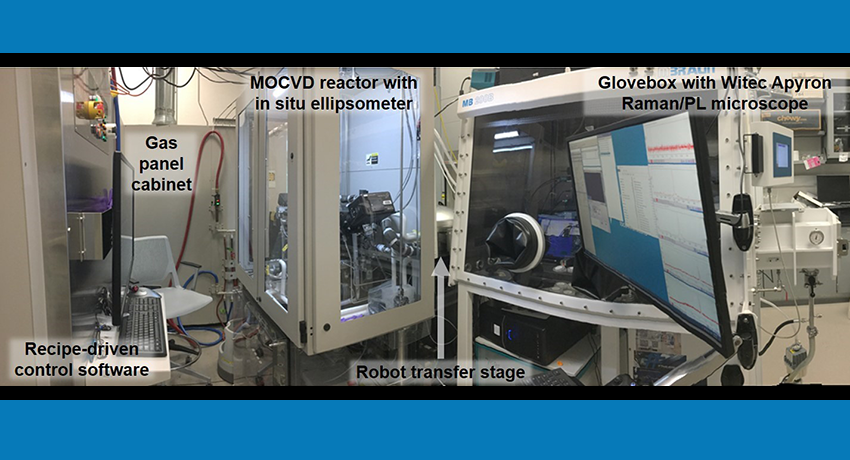
MOCVD2 is a custom designed multi-module system from CVD Equipment Corporation. The system includes a load lock and high vacuum robotic transfer stage with three additional ports. A stainless-steel chamber for metalorganic chemical vapor deposition (MOCVD) of chalcogenides is connected to one of the ports. The chamber consists of temperature-controlled wall and flanges, removable quartz liners and a rotating, resistively heated 2” diameter substrate holder for substrate temperatures up to 1000 °C. The MOCVD reactor includes two purged optical ports for in situ spectroscopic ellipsometry and a third for sample viewing.
The chamber exhaust includes cold-finger traps for chalcogen removal and a chemically resistant rotary vane pump that enables system operation from 10 to 700 Torr. The gas manifold is comprised of welded stainless-steel tubing with metal gasket seal fittings, pneumatically controlled valves, pressure controllers and mass flow controllers. Six bubbler manifolds are available for liquid or solid precursors two of which include double dilution and two which can be maintained at elevated temperature (up to 200oC) for low vapor pressure sources. Three pressure balanced vent/run manifolds are available for metal, chalcogen and dopant precursors.
System operation is controlled by CVD WinPrCTMsoftware which includes recipe-driven control and data logging. The system has an interlocked safety system including toxic gas monitoring, H2 detection and other alarms for safe operation. A pyrolyzer/water scrubber equipped with a sodium hydroxide neutralization system treats the reactor effluents to safe limits.
A robotic transfer stage enables transfer of samples directly from the MOCVD growth chamber into a custom designed Mbraun glovebox for optical characterization. Samples can also be loaded into the glovebox through a vacuum purged antechamber. A WITec Apyron confocal microscope is housed in the glovebox to enable ambient-controlled Raman and photoluminescence measurement. The Witec microscope is fully automated with joystick controller to enabling automated change of lasers (532 nm and 633nm), gratings (300, 600, and 1800 grooves/mm), objective lenses (x5, x10, x50, x100), focus (z height) and stage motion (x-y location), etc. The small footprint of the glovebox analysis chamber (50 in. x 35 in.) was enabled by vertical integration of the WITec microscope and optical fiber coupling with the laser sources and UHTS 600 spectrometer located on top of the glovebox.
See the full list of available thin film samples.
Quick Spec
CVD Equipment Corporation
J7233 Penn State MOCVD
J7233
Capabilities
- Load lock and high vacuum robot transfer stage
- Stainless steel deposition chamber with temperature-controlled walls
- Resistive heater for 2” diameter substrates with rotation
- Removable quartz liner and gas inlets in deposition chamber
- 3 purged optical ports on deposition chamber for in situ characterization
- 3 pressure balanced vent/run manifolds
- 6 bubblers manifolds for liquid/solid sources (2 double dilution, 2 high temperature)
- 4 gas source lines (H2Se, H2S, etc.)
- Toxic gas monitoring by integrated gas detection/exhaust and scrubber/safety system
- CVD WinPrCTM software for recipe-driven control and data logging
- M-2000 in situ spectroscopic ellipsometer (J.A. Woollam) XI-210 with NIR upgrade
- MBraun glovebox with WITec Apyron confocal Raman/photoluminescence microscope
Current Process Capabilities
- Wafer scale process developed: WS2, WSe2 and MoS2 monolayers on 2” c-plane sapphire
- Metal Precursors: Mo(CO)6, W(CO)6
- Chalcogen Precursors: H2S, H2Se, Diethyl Telluride
- Carrier gas: Purified hydrogen or nitrogen
- List of currently available samples
Location
2DCC
N-125A
Millenium Science Complex
491 Pollock Road
University Park, PA 16803
United States
Nichole Wonderling awarded prestigious fellowship
By Jamie Oberdick
Nichole Wonderling, assistant research professor and X-ray scattering manager at the Materials Research Institute’s (MRI) Materials Characterization Lab (MCL), has been named a fellow by the International Centre for Diffraction Data (ICDD). The fellowship recognizes exceptional contributions to the field of materials characterization and dedicated service to the ICDD community.
Biodegradable electronics may advance with ability to control dissolve rate
By Mariah Lucas
Biodegradable electronics allow for medical devices — such as drug delivery systems, pacemakers or neural implants — to safely degrade into materials that are absorbed by the body after they are no longer needed. But if the water-soluble devices degrade too quickly, they cannot accomplish their purpose. Now, researchers have developed the ability to control the dissolve rate of these biodegradable electronics by experimenting with dissolvable elements, like inorganic fillers and polymers, that encapsulate the device.
Scarlett Miller
"(Re)Focusing on the human dimension: How immersive technologies and human centered design can advance materials research"
Jessica Menold
"(Re)Focusing on the human dimension: How immersive technologies and human centered design can advance materials research"
Researchers engineer new approach for controlling thermal emission
By Ashley WennersHerron
Finely created interfaces offer new design strategies beyond conventional materials for applications in infrared optics, sensing and more, researchers say
Nitin Samarth honored with Adler Lectureship Award from American Physical Society
Nitin Samarth, Verne M. Willaman Professor of Physics, has been selected to receive the American Physical Society’s 2024 David Adler Lectureship Award in the Field of Materials Physics. The award recognizes an outstanding contributor to the field of materials physics who is notable for high quality research, review articles, and lecturing.

